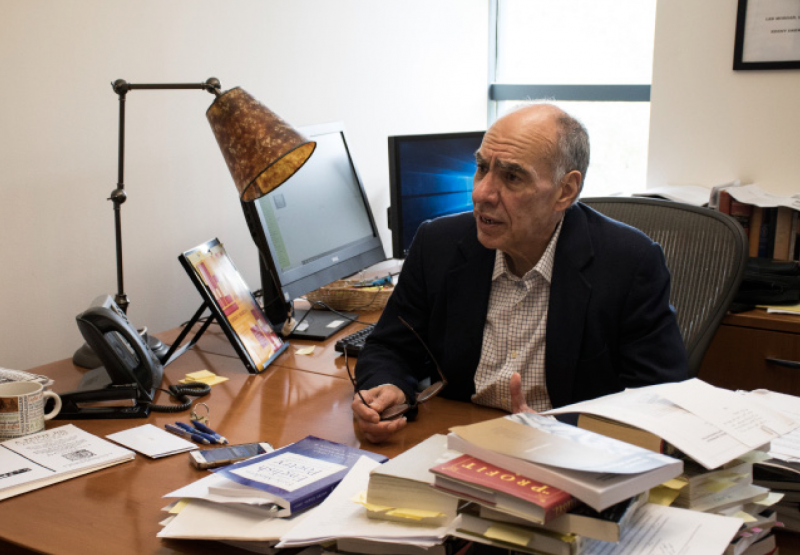In 1980, Jimmy Carter was president of the United States, the Berlin Wall was still standing, and Nina Ekstein had just started teaching at Trinity.
Nina Ekstein, professor in the Department of Modern Languages and Literatures, was on the original committee for HUMA, is approaching her 39th year at Trinity. In her time here, Ekstein said she has found the changes in the attitude towards education most worrying, especially the overuse of technology.
“There are enormous changes. There have been a number of them. The things that strike me the most violently, I’ll use that word, is technology — and not so much the computer as the cellphone and social media — as being a very problematic force. I used to walk into the classroom — they’d shut up cause they’ve been talking to each other, probably about me. Nobody in my classes are talking to each other; they’re all on their phones. I think that’s really sad,” Ekstein said.
Ekstein also believes that both the importance of money in college and the way education is becoming a profitable business negatively impacts the mindset of students.
“The other thing that has really changed is the role of money. Money is way too important in college right now,” Ekstein said. “You’re paying so much. It is really hard to remember as a student what it is you’re paying for, and you start feeling like, ‘I’m paying for this education, I need to get good grades, I need the credit,’ instead of, ‘I’m paying for an opportunity.’ Instead, our whole culture has turned things that shouldn’t cost anything into sources of money making.”
Ekstein’s advice to students was to think critically.
“Question everything — not really, but question everything. Think, use your brain, ask why — why are we doing this? Why is this important? And work hard,” Ekstein said.
Willis Salomon, professor in the Department of English, also teaches HUMA and has taught at Trinity for 35 years. He started teaching at Trinity because he found the small liberal arts environment appealing.
“Academic jobs in the humanities have been extremely difficult to get for the past four-plus decades. I considered myself extremely fortunate at the time to be offered a job at such an appealing, smaller liberal arts university, and I have considered myself extremely fortunate to be here ever since,” Salomon wrote in an e-mail interview.
Salomon’s advice to students was to participate and be involved in academic activities as well as social activities.
“Never hesitate to ask a question of anyone: faculty, staff, each other. Also, do your work on time and don’t miss class; college is really all about ‘showing up,’ with all that metaphor implies,” Salomon wrote.
Salomon’s advice for new faculty was to broaden the perspective of research being done and to focus on teaching, as teaching causes one to shift views of a subject.
“For new faculty, I would say focus primarily and most intensely on your institutional role as a teacher [and] scholar. Allow yourself to see how your research, broadly conceived, makes you more challenging and effective in the classroom and how the demands of teaching can provoke in you new ways of seeing your intellectual work,” Salomon wrote.
James Shinkle, professor in the Department of Biology, occasionally teaches the Science Fiction First-Year Experience course and has taught at Trinity for 31 years. He started working at Trinity because he believed that the expectations suited him.
“I went to a similar small college myself; I went through graduate school watching very fine professors barely making it through tenure because they were at the mercy of how their research was going, and if you ended up at the end of your sixth year just short of a major discovery — even if it happens three months later — you were gone. And I like doing research, I wanted to do it well, but I realized that a place that has a balance between teaching and research would give me a chance to develop a skill set that I was more under control of the outcomes than just whether or not I cross the finish line by a fairly arbitrary standard,” Shinkle said.
Shinkle believed that Trinity was the right choice for him, as the standards of professors’ evaluations fit his perspective of a professor.
“[Trinity values] multiple types of accomplishments. It certainly wasn’t the case that I did not have to be productive as a scholar — it was just that the standards were you have to be a good scholar, not that you have crossed some particular boundary. There were more ways to demonstrate capability than the very narrow ‘get x number of papers out and bring y numbers of billions of dollars of grant money in.’ Being able to be more involved with teaching was also very attractive,” Shinkle said.
Shinkle urged students to explore and take classes that match their interests as opposed to limiting themselves to specific courses to progress in a major.
“Find ways to get out of your silo … Instead of [confining yourself in a major or even a double major,] you should just not see opportunities as necessarily fitting into a box — just as something you care about. Be more open-minded to begin with but then be more definite about what you personally want as opposed to [following the general trend],” Shinkle said.




